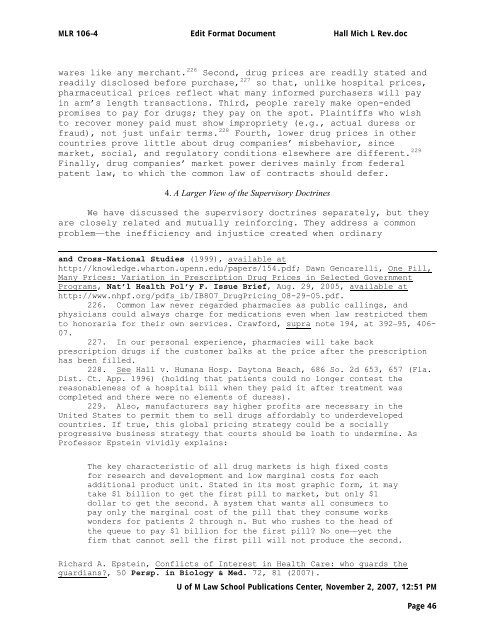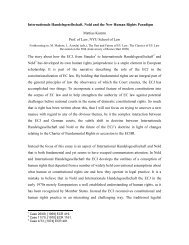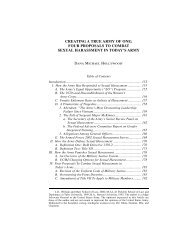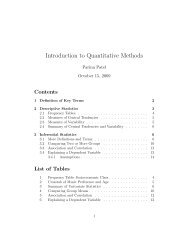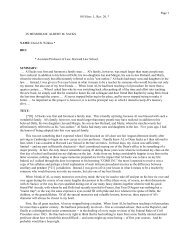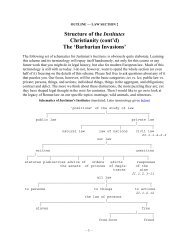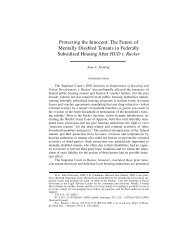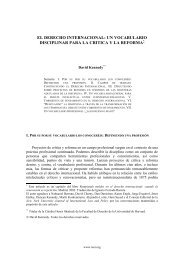Patients as Consumers - Harvard Law School
Patients as Consumers - Harvard Law School
Patients as Consumers - Harvard Law School
Create successful ePaper yourself
Turn your PDF publications into a flip-book with our unique Google optimized e-Paper software.
MLR 106-4 Edit Format Document Hall Mich L Rev.doc<br />
wares like any merchant. 226 Second, drug prices are readily stated and<br />
readily disclosed before purch<strong>as</strong>e, 227 so that, unlike hospital prices,<br />
pharmaceutical prices reflect what many informed purch<strong>as</strong>ers will pay<br />
in arm’s length transactions. Third, people rarely make open-ended<br />
promises to pay for drugs; they pay on the spot. Plaintiffs who wish<br />
to recover money paid must show impropriety (e.g., actual duress or<br />
fraud), not just unfair terms. 228 Fourth, lower drug prices in other<br />
countries prove little about drug companies’ misbehavior, since<br />
market, social, and regulatory conditions elsewhere are different. 229<br />
Finally, drug companies’ market power derives mainly from federal<br />
patent law, to which the common law of contracts should defer.<br />
4. A Larger View of the Supervisory Doctrines<br />
We have discussed the supervisory doctrines separately, but they<br />
are closely related and mutually reinforcing. They address a common<br />
problem—the inefficiency and injustice created when ordinary<br />
and Cross-National Studies (1999), available at<br />
http://knowledge.wharton.upenn.edu/papers/154.pdf; Dawn Gencarelli, One Pill,<br />
Many Prices: Variation in Prescription Drug Prices in Selected Government<br />
Programs, Nat’l Health Pol’y F. Issue Brief, Aug. 29, 2005, available at<br />
http://www.nhpf.org/pdfs_ib/IB807_DrugPricing_08-29-05.pdf.<br />
226. Common law never regarded pharmacies <strong>as</strong> public callings, and<br />
physicians could always charge for medications even when law restricted them<br />
to honoraria for their own services. Crawford, supra note 194, at 392–95, 406-<br />
07.<br />
227. In our personal experience, pharmacies will take back<br />
prescription drugs if the customer balks at the price after the prescription<br />
h<strong>as</strong> been filled.<br />
228. See Hall v. Humana Hosp. Daytona Beach, 686 So. 2d 653, 657 (Fla.<br />
Dist. Ct. App. 1996) (holding that patients could no longer contest the<br />
re<strong>as</strong>onableness of a hospital bill when they paid it after treatment w<strong>as</strong><br />
completed and there were no elements of duress).<br />
229. Also, manufacturers say higher profits are necessary in the<br />
United States to permit them to sell drugs affordably to underdeveloped<br />
countries. If true, this global pricing strategy could be a socially<br />
progressive business strategy that courts should be loath to undermine. As<br />
Professor Epstein vividly explains:<br />
The key characteristic of all drug markets is high fixed costs<br />
for research and development and low marginal costs for each<br />
additional product unit. Stated in its most graphic form, it may<br />
take $1 billion to get the first pill to market, but only $1<br />
dollar to get the second. A system that wants all consumers to<br />
pay only the marginal cost of the pill that they consume works<br />
wonders for patients 2 through n. But who rushes to the head of<br />
the queue to pay $1 billion for the first pill? No one—yet the<br />
firm that cannot sell the first pill will not produce the second.<br />
Richard A. Epstein, Conflicts of Interest in Health Care: who guards the<br />
guardians?, 50 Persp. in Biology & Med. 72, 81 (2007).<br />
U of M <strong>Law</strong> <strong>School</strong> Publications Center, November 2, 2007, 12:51 PM<br />
Page 46


